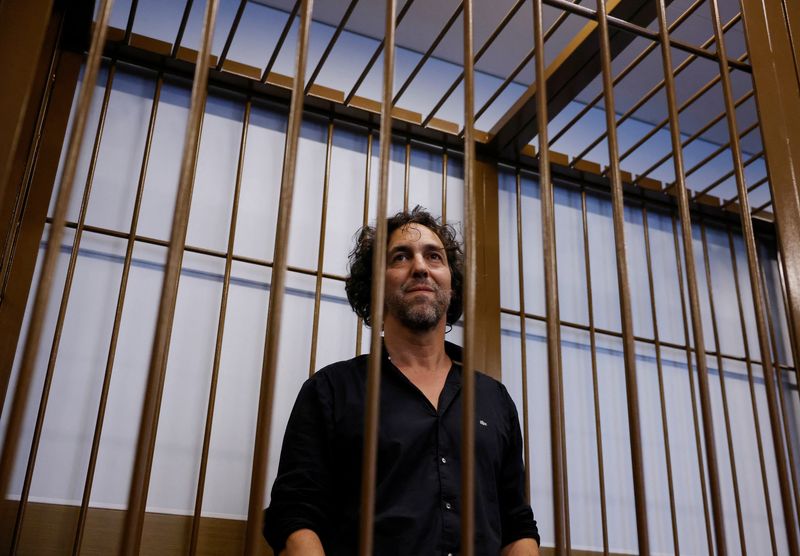French researcher pleads guilty in Moscow for failing to register as foreign agent
2024.06.07 11:35
By Lucy Papachristou and Filipp Lebedev
(Reuters) -French researcher Laurent Vinatier pleaded guilty in a Moscow court on Friday to a charge of failing to register as a foreign agent while gathering information on the Russian military.
Vinatier, 47, could face up to five years in prison. He was placed in pre-trial custody until Aug. 5, despite a request to free him endorsed by the French embassy.
“I apologise for not registering as a foreign agent. The most upsetting thing is that throughout the 10 years of my work I tried to defend Russia and its interests,” state news agency RIA quoted him as saying in court.
Vinatier is a Russia specialist and adviser to HD, a Swiss-based conflict mediation group whose full name is the Centre for Humanitarian Dialogue.
A short video posted by the Moscow courts service showed the Frenchman being led in handcuffs into the courtroom and ushered into a barred metal cage at the start of the hearing.
He joins a growing list of foreign nationals detained in Russia who have found themselves caught up in the crisis in relations between Russia and the West during the Ukraine war.
U.S. reporter Evan Gershkovich is awaiting trial on spy charges and Russian-American journalist Alsu Kurmasheva for failing to register as a foreign agent. Another American, Paul Whelan, was jailed for 16 years in 2020. All deny any guilt, and the U.S. has accused Moscow of conducting “hostage diplomacy”.
Gordon Black, a U.S. soldier, went on trial in Russia’s Far East on Thursday on suspicion of stealing from his Russian girlfriend and threatening to kill her.
French President Emmanuel Macron on Thursday denied Vinatier worked for the French state and described his arrest as part of a campaign of disinformation by Moscow.
FOREIGN AGENT LAW
Under Russian law, a person is obliged to contact the justice ministry and register as a foreign agent if they are involved in political activity or collecting military information while receiving financial or other help from abroad.
Russia has applied the “foreign agent” label widely in the past decade to stifle opposition and discredit opposition figures, journalists and organisations critical of the Kremlin.
A letter signed by France’s consul general in Moscow, Patrice Servantie, and shown to Reuters by Vinatier’s lawyer, said the scholar would not abscond if released: “Mr. Vinatier is a responsible and law-abiding citizen, he will comply with all the requirements of the law of the Russian Federation.”
Russia’s Investigative Committee, which handles serious crimes, said Vinatier was suspected to have “purposefully collected information in the field of military and military-technical activities” which could be used against the security of the state.
Vinatier specialises in Russia, the Caucasus and Central Asia and has worked as an adviser to HD for 10 years, based in Geneva, according to his LinkedIn profile.
HD’s website says it has operated since 1999 to “help prevent, mitigate and resolve armed conflict through dialogue and mediation” in countries such as Spain, the Philippines and Libya.
Fellow academics who know Vinatier described him as a respected scholar and dismissed any suggestion he was involved in espionage.
“He is a phenomenal academic who conducted research in risky conditions for over 15 years, including in Chechnya and Belarus,” said Jean-Francois Ratelle, an assistant professor at the University of Ottawa.
“The FSB (Russia’s Federal Security Service) kept close tabs on him,” Ratelle told Reuters, saying he too had been subjected to FSB interrogations on research trips to Russia. Vinatier’s arrest “underlines how dangerous conducting academic research in Russia has become”, he said.

Frédérique Longuet-Marx, a French anthropologist who was Vinatier’s adviser for his PhD thesis on the Chechen diaspora, said she was “very shocked” to hear of his arrest.
She told Reuters Vinatier had worked on peacemaking efforts in several countries of the former Soviet Union and authored two books on Chechnya.








